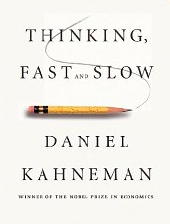Why Our Minds Swap Out Hard Questions For Easy Ones
“When faced with a difficult question, we often answer an easier one instead, usually without noticing the substitution,” writes psychologist and Nobel Prize winner Daniel Kahneman, in a new book.

“When faced with a difficult question, we often answer an easier one instead, usually without noticing the substitution,” writes Kahneman.
Why do we keep making irrational decisions?
Consider this. There’s an experiment that shows how judgment is often informed by partially reliable or even totally insignificant information – what psychologists call “the anchoring effort.” It goes like this:
Subjects are shown a wheel of fortune. Unbeknownst to them, the wheel only stops on numbers 10 and 65. After the wheel is spun, subjects are asked a totally unrelated question: What is your best guess of the percentage of African nations in the UN? The average estimate of people who have just seen the number 10 is 25%. The average estimate of people who have just seen the number 65 is 45%. The answers are anchored by the previous information, even when there was no link between them.
“We pass through this life on the receiving end of a steady signal of partially reliable information that we only occasionally, and under duress, evaluate thoroughly,” writes Michael Lewis in the December 2011 issue of Vanity Fair. “It’s unsettling to know that your judgment can be so heavily influenced by some random number and disturbing to realize it is probably happening all the time.”
Lewis’s article “The King of Human Error” profiles psychologist Daniel Kahneman, 2002 winner of the Nobel Prize in Economic Sciences and senior scholar at the Woodrow Wilson School of Public and International Affairs and professor of psychology emeritus at the same school. Kahneman is author of the new Thinking, Fast and Slow (Farrar, Straus and Giroux, 2011), which includes a passage on the wheel of fortune test.
Kahneman and his professional collaborator Amos Tversky spent the 1970s and early 80s pursing “an extraordinary number of strange and inventive experiments,” Lewis writes, which “demonstrated how essentially irrational human beings can be.” It is their work that helps explain much of what Lewis detailed in his 2003 book Moneyball, the story of how a handful of executives in the baseball world had begun using statistics and analytics to identify overlooked and still-valuable players. (Lewis didn’t know of the researchers until after his book came out.)

Comments (4)
"To Whom Shall I Tell My Grief?" - Vital
GiveWell: a case study in effective altruism, part 4 | Compass Rose
Opportunity Cost of NASA « azmytheconomics
Why Our Minds Swap Out Hard Questions For Easy Ones | Accounting and Small Business /Beverly Shares